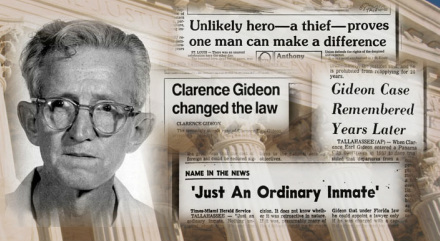June 3, 1961: Arrest made in case that leads to 'right to an attorney'

A Panama City pool room owner on June 3, 1961 reported an overnight break-in and the theft of $5 in change and a few bottles of beer and soda. Later that day, police arrested a semi-literate drifter, Clarence Earl Gideon, 50, with a pint of wine and change in his pockets after a witness said he saw him in the pool room at 5:30 a.m.
At his arraignment, Gideon said he could not afford a lawyer and asked the judge to appoint one for him. He argued that the Sixth Amendment said everyone is entitled to a lawyer. The judge refused Gideon's request, stating -- correctly at the time -- that the state did not have to pay for a poor person's defense unless it involved a capital crime or "special circumstances."
Gideon defended himself and did a poor job, calling police officers to testify on his behalf, not knowing they would have no reason to help his case. Gideon was found guilty of breaking and entering and petty larceny and sentenced to five years in prison.
He began studying law in the prison library. He petitioned the state Supreme Court for his release, arguing he had been imprisoned illegally. After that petition was rejected, he turned to the United States Supreme Court, which agreed to consider his appeal.
In a unanimous decision in 1963, the U.S. Supreme Court held that every poor person charged with a serious crime had a right to free counsel for his defense.
The justices wrote, "In our adversary system of justice, any person hauled into court who is too poor to hire a lawyer cannot be assured a fair trial unless counsel is provided for him."
Gideon won a retrial and this time was represented by professional counsel. He was acquitted.
The Supreme Court decision freed 1,500 Florida inmates. Six thousand filed for new trials, and 2,000 received another day in court.
Gideon married and moved to Fort Lauderdale before dying of cancer in 1972, at age 61. His family brought his body back to Hannibal, Missouri, and buried him in an unmarked grave a few feet from his father. In November 1994, the American Civil Liberties Union heard about the unmarked grave and placed a granite headstone, engraved with a line from Gideon's November 1962 handwritten letter to Supreme Court Justice Abe Fortas: "I believe that each era finds an improvement in law for the benefit of mankind."
New York Times columnist Anthony Lewis wrote about the case in a 1964 book, Gideon's Trumpet, that in 1980 was made into a Hallmark Hall of Fame television movie starring Henry Fonda as Gideon.
Read more:
• uscourts.gov: Facts and Case Summary: Gideon V. Wainwright
• National Association of Criminal Defense Lawyers: Clarence Earl Gideon: Unlikely World Shaker
At his arraignment, Gideon said he could not afford a lawyer and asked the judge to appoint one for him. He argued that the Sixth Amendment said everyone is entitled to a lawyer. The judge refused Gideon's request, stating -- correctly at the time -- that the state did not have to pay for a poor person's defense unless it involved a capital crime or "special circumstances."
Gideon defended himself and did a poor job, calling police officers to testify on his behalf, not knowing they would have no reason to help his case. Gideon was found guilty of breaking and entering and petty larceny and sentenced to five years in prison.
He began studying law in the prison library. He petitioned the state Supreme Court for his release, arguing he had been imprisoned illegally. After that petition was rejected, he turned to the United States Supreme Court, which agreed to consider his appeal.
In a unanimous decision in 1963, the U.S. Supreme Court held that every poor person charged with a serious crime had a right to free counsel for his defense.
The justices wrote, "In our adversary system of justice, any person hauled into court who is too poor to hire a lawyer cannot be assured a fair trial unless counsel is provided for him."
Gideon won a retrial and this time was represented by professional counsel. He was acquitted.
The Supreme Court decision freed 1,500 Florida inmates. Six thousand filed for new trials, and 2,000 received another day in court.
Gideon married and moved to Fort Lauderdale before dying of cancer in 1972, at age 61. His family brought his body back to Hannibal, Missouri, and buried him in an unmarked grave a few feet from his father. In November 1994, the American Civil Liberties Union heard about the unmarked grave and placed a granite headstone, engraved with a line from Gideon's November 1962 handwritten letter to Supreme Court Justice Abe Fortas: "I believe that each era finds an improvement in law for the benefit of mankind."
New York Times columnist Anthony Lewis wrote about the case in a 1964 book, Gideon's Trumpet, that in 1980 was made into a Hallmark Hall of Fame television movie starring Henry Fonda as Gideon.
Read more:
• uscourts.gov: Facts and Case Summary: Gideon V. Wainwright
• National Association of Criminal Defense Lawyers: Clarence Earl Gideon: Unlikely World Shaker

